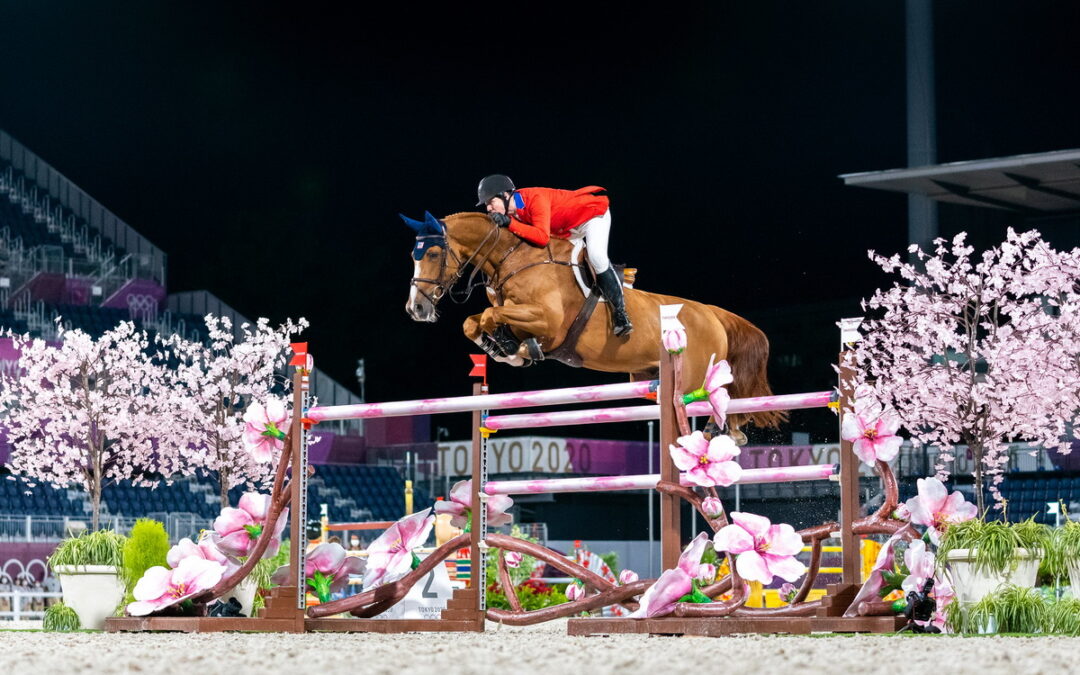Time for a deep breath, as the equestrian portion of the Olympics comes to an end. For some riders, that deep breath will be a sigh, as they’re wishing things had gone better.
For others, it will be a chance to remove the masks that were omnipresent in Tokyo, take in some fresh air and show the world their smiles for more than a one-minute photo shoot.
It’s been hard work, not just during the Games, the quarantine that preceded them and the problems of the Covid pandemic, but all the years that built up to the precious few moments that decided the medals.
In one of the most exciting Olympic show jumping finals ever, Sweden took gold in a jump-off with the U.S., decided on time by a margin of 1.3 penalties as all the riders jumped fault-free in the tie-breaker and the prizes were decided on cumulative time. (For a rider-by-rider account of the team final, look at the second story below on this website.)
It was Sweden’s first Olympic gold in show jumping since 1924.
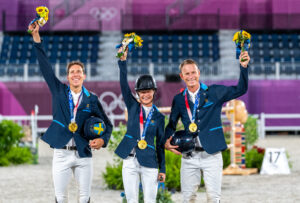
The Swedish gold medal team: Henrik von Eckermann, Malin Baryard-Johnsson, Peder Fredricson. (Photo courtesy of FEI)
“Yes it’s a dream come true–to win an Olympic gold medal. I think that’s every athlete’s dream for sure,” said Swedish team rider Malin Baryard-Johnsson, whose knockdown with Indiana in the first round today was the only rail dropped by anyone on her squad throughout the individual and team show jumping. No other team came close to matching that.
“We’ve been so well-prepared for everything at this championship, we’ve not missed out on anything. We have a team behind us that’s incredible.
“All of us, the way we’ve ridden, shows how confident we’ve been and how they’ve all made it possible for us to totally focus on what to do in there. We knew it was very possible for a jump-off because it was only one round (Nations Cups are two rounds) and we knew we didn’t want the silver medal this time,” said Malin, a member of the Athens Swedish silver medal team in 2004.
“The riders and everybody gave everything they had to give. It was great sport,” said USA anchorman McLain Ward, who secured his team’s medal with a fast, clear round on Contagious.
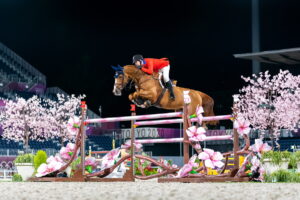
McLain Ward and Contagious. (Photo courtesy FEI).
“It was great to be in the battle. Sweden’s win wasn’t unexpected here, but they took it to another level. We would have had to have an incredible day to beat them. I think we pushed them right to the limit, and in competition, when you push them to that limit and they still win, you’ve got to be proud of the fight.”
The Swedes’ individual silver medalist, Peder Fredricson on All In, was last to go and knew the time to beat.
“Oh, the pressure was on,” he said. “My God, in these situations, when you have two teams like this you really want to win. McLain was fast, I saw his round and I knew what I had to do, and today the poles stayed up and the time was on my side.”
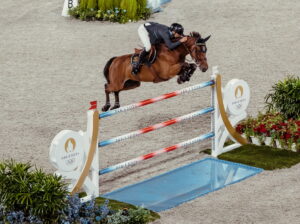
Peder Fredricson and All In. (Photo courtesy FEI)
McLain was clocked in 39.92 seconds; Peder in 39.01.
“I had the speed and I gave him (All In) a lot of room. It’s unbelievably satisfying to get this gold. And my horse deserves it also for the way he jumped, I’m so happy for him and his owner and groom and the whole team and my team-mates. This is a great feeling,” Peder said.
Laura Kraut, who blazed the way for the U.S. today with a clear in the first round on Baloutinue, noted of the horse she has ridden for only four months, “He’s new really to this level of jumping and he’s gotten better each day that he jumped.
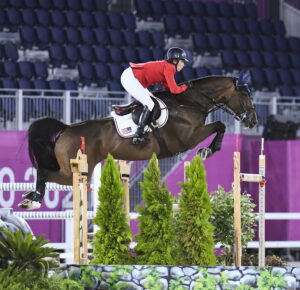
Laura Kraut and Baloutinue. (Photo courtesy FEI)
I think that was (Coach) Robert Ridland‘s idea when he put me on (the team) We knew the horse has plenty of blood and plenty of energy. Obviously, for Robert Ridland, tonight is his night so I think all week was geared toward this.”
“It’s what you dream of,” said Coach Robert, echoing the thoughts of Malin and the other riders who medaled in Tokyo.
“We came up with a plan a long time ago and the emphasis was always going to be on the team competition. The plan was, of course, that we’re bringing four riders here and all four were going to be whatever results we were able to get,” he explained.
“Today was supposed to be the day that we really channeled everything, and we tried to leave as much gas in the tank as we could through the qualifying round to get there, and we’ve all been saying that the team was going to be three rounds and we were prepared for that. It just became magical. It was sweet revenge for Sweden (from the 2018 FEI World Equestrian Games, where the jump-off went the other way) and it’s a great rivalry. They were amazing and we pushed them to the limit and that’s what has made us proud.”
Jessie Springsteen, the USA’s Olympic first timer, put in her first fault-free trip of the Games in the jump-off, when it really counted.
Her stallion, Don Juan van de Donkhoeve, “has a big step I was able to do the leaveouts and that helped with the time allowed,” she said, explaining that Santiago Varela’s course featured “a lot of half-strides where you had the option to do one less or one more” stride.
Coach Robert likes to pair younger riders with veterans, as he did in the 2014 and 2016 Olympics with Lucy Davis. Jessie obviously was in that spot in Tokyo, and being flanked by veterans obviously was a help in her Games debut.
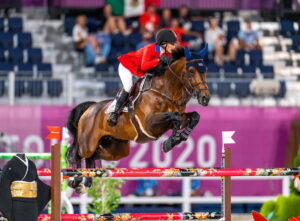
Jessie Springsteen and Don Juan. (Photo courtesy FEI)
Three teams didn’t finish–France, which had been leading, was eliminated when its anchor rider, Penelop LeProvost, garnered two refusals with Vancouver de Lanlore. Germany’s star, world number one-ranked Daniel Deusser, had trouble at the triple and retired Killer Queen from the competition. With no drop score due to the inception of the three-member teams for Tokyo, Germany was out.
Britain elected to withdraw after its first two starters, Holly Smith and Harry Charles collected 16 and 8 jumping faults respectively, which meant there was no need for Tokyo individual gold medalist Ben Maher to compete on Explosion W. They are thenumber one horse/rider combination in the world.
Ben explained, “Holly and Harry are young riders, they’ve ridden incredibly tonight. but unfortunately, it hasn’t gone our way as a team. Explosion’s welfare is paramount for me. I’m not a quitter on the team, I always push to the end, but we’re a long way off any medal contention and he’s done everything for Team GB and me as a ride this week, and the welfare of him becomes a priority.
“It doesn’t make any difference that we won the individual gold. Yes, he goes back as an Olympic champion – I always knew he was an incredible horse before he came here this week – but this decision is based purely on the team as a whole. We had a decision as a team and any horse’s welfare becomes a priority. This way, he goes home one round less and saved hopefully for another day when we are in medal contention.”

